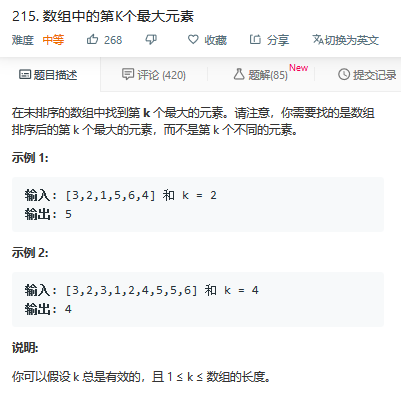leetcode-215-数组中的第K个最大元素*
题目描述:

方法一:堆排序*
class Solution: def findKthLargest(self, nums: List[int], k: int) -> int: def adjust_heap(idx, max_len): left = 2 * idx + 1 right = 2 * idx + 2 max_loc = idx if left < max_len and nums[max_loc] < nums[left]: max_loc = left if right < max_len and nums[max_loc] < nums[right]: max_loc = right if max_loc != idx: nums[idx], nums[max_loc] = nums[max_loc], nums[idx] adjust_heap(max_loc, max_len) # 建堆 n = len(nums) for i in range(n // 2 - 1, -1, -1): adjust_heap(i, n) #print(nums) res = None for i in range(1, k + 1): #print(nums) res = nums[0] nums[0], nums[-i] = nums[-i], nums[0] adjust_heap(0, n - i) return res
class Solution: def findKthLargest(self, nums: List[int], k: int) -> int: return heapq.nlargest(k, nums)[-1]
方法二:快速排序
class Solution: def findKthLargest(self, nums: List[int], k: int) -> int: def partition(left, right): pivot = nums[left] l = left + 1 r = right while l <= r: if nums[l] < pivot and nums[r] > pivot: nums[l], nums[r] = nums[r], nums[l] if nums[l] >= pivot: l += 1 if nums[r] <= pivot: r -= 1 nums[r], nums[left] = nums[left], nums[r] return r left = 0 right = len(nums) - 1 while 1: idx = partition(left, right) if idx == k - 1: return nums[idx] if idx < k - 1: left = idx + 1 if idx > k - 1: right = idx - 1
方法三:bfprt算法*
class Solution: def findKthLargest(self, nums, k): index=self.BFPRT(nums, 0, len(nums) - 1, len(nums) - k + 1) return nums[index] def BFPRT(self, nums, l, r, k) : if l==r: return l pivot_index = self.getPivotIndex(nums, l, r) divide_index = self.partion(nums, l, r, pivot_index) num = divide_index - l + 1 # 当前的pivot是当前范围内排名第几小的 if k == num: return divide_index elif num > k: return self.BFPRT(nums, l, divide_index - 1, k) else: return self.BFPRT(nums, divide_index + 1, r, k - num) def getPivotIndex(self, nums, l, r): if (r - l < 5): return self.insertSort(nums, l, r) tmp = l for i in range(l, r, 5): if i+4>r: break index = self.insertSort(nums, i, i + 4) # 获取每个组的中位数索引 nums[tmp], nums[index] = nums[index], nums[tmp] # 将每个组的中位数放置在数组的左端 tmp = tmp + 1 return self.BFPRT(nums, l, tmp - 1, (tmp - 1 - l) // 2 + 1) # 获取这几个中位数的中位数 def insertSort(self, nums, l, r): # 插入排序 for i in range(l + 1, r + 1): tmp = nums[i] j = i - 1 while j >= l and nums[j] > tmp: nums[j + 1] = nums[j] j -= 1 nums[j + 1] = tmp return (r + l) // 2 # 返回的是索引 def partion(self, nums, l, r, pivot_index): nums[l], nums[pivot_index] = nums[pivot_index], nums[l] # 交换至最左侧 pivot = nums[l] i, j = l, r while i < j: while i<r and nums[i] <= pivot: i += 1 while l<j and nums[j] >= pivot: j -= 1 if i < j: nums[i], nums[j] = nums[j], nums[i] nums[j], nums[l] = nums[l], nums[j] return j



 浙公网安备 33010602011771号
浙公网安备 33010602011771号